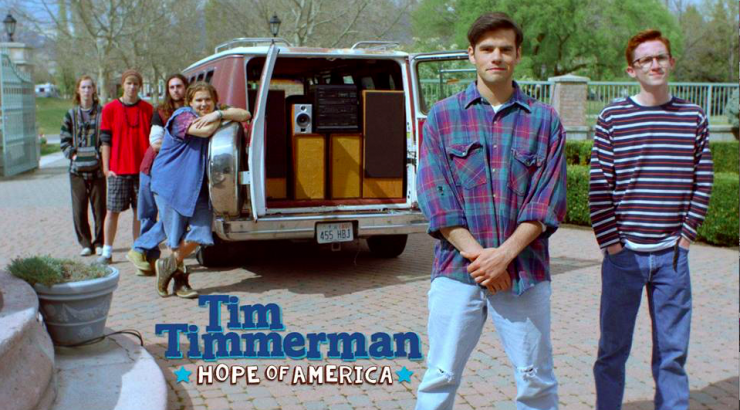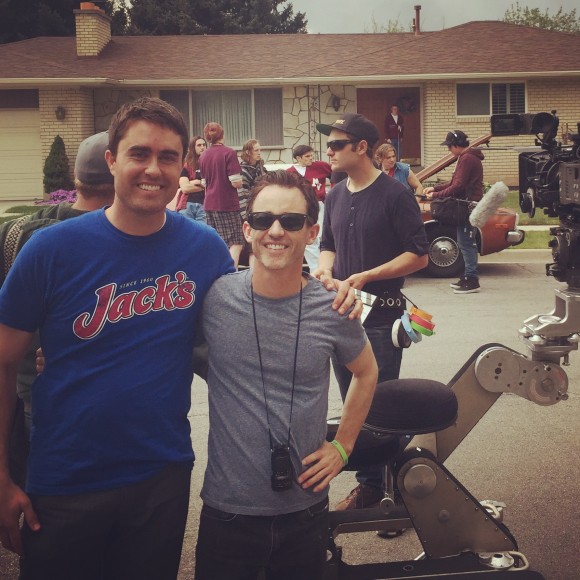
Independent Film: Making My First Feature
March 21, 2016
EDITOR’S NOTE: No one knows better that making a feature isn’t easy than Cameron Sawyer (MFA/Film Production ’09). Today, he shares with us the trials and tribulations of making his first feature film.
Making a feature film is scary, especially when it’s your first! It is all you can do to convince investors to take a chance on a mostly unproven director, and if the movie ends up flopping you may not get another opportunity.
Shortly after graduating from Chapman, I had a script idea for a high school comedy set in the mid 90’s, loosely based on my experiences as the worst student body president in my high school’s history. The title was
Tim Timmerman, Hope of America
.
I had made some short films and thought ‘how hard could it be?’ This would be just a longer short. However, I quickly figured out how daunting this process would become. I had to write a script, raise the money, produce the movie, and sell it, all on a much bigger scale.
I took a low stress job as an office assistant for a law firm in Beverly Hills so I had time to write and refine the script. The job was flexible and provided a quiet space in the mornings and evenings to put my ideas to the page. It wasn’t long before I had what I thought was a solid outline and tons of material; a slue of characters, multiple story lines and killer scenes. This movie was going to be my
Citizen Kane
!
It took about six months to finish the first draft. It was 135 pages long! Brilliant, but way over the 90-page limit. There was no way I could convince investors to fund this script; long films are expensive. On top of that, what audience on God’s green earth would ever sit through a two and a half hour high school comedy? Darlings had to die, but which ones?

I brought on a writing partner to help me draft a new outline. We cut scenes, cut characters, added characters, and modified the storyline. It took us a year to get down to 115 pages. Still too long.
Trusted writer friends gave me some helpful notes, but the most effective feedback was from Madeline Warren’s producing class at Chapman. She had been showing her class my successful short film
She’s a Fox
and reached out to me to see if I had a feature length script her class could look at. It was a bit nerve-racking to turn my script over to a classroom of students, but the timing was great, and it allowed me to get many perspectives on how the story was playing out.
Raising money was a challenge. It took nine months to raise just enough to go into production. I had reached out to every wealthy person I knew and was surprised to find my biggest investors were contemporaries, rather than the more established older group I had initially approached.
When I had enough to go into production, I panicked, questioning the script. Was it good enough? Had I made too many creative compromises? And was there now too much on the line to move forward with confidence?
I was a mess and even considered halting production to continue finessing the script. It was my producers that helped me understand the timing was right to move forward. I swallowed my creative pride and we went directly into production.
The shoot was 23 grueling days, with only Sunday’s off. And I used the days off to prepare for the next week. I had never experienced something so taxing on my body and mind.
I was happy with how the shoot went, but when I saw the first cut I just about threw up. It did not look like the movie I had originally envisioned. I questioned the decision to move forward yet again.
The producers and I put our minds together and figured out ways to make what we had shot come to life. We did five days of re-shoots, added new scenes, and went through a long post-production process.
We’ve now had two test screenings and I am thrilled with how well the film is being received. It’s awesome validation that all the hard work and sacrifice may pay off. I like the end product so much, and it has been nice to look back on all the things I’ve learned through the process.
Perhaps the greatest thing I’ve learned is that when it comes to making a feature, you need the help of skilled craftsman all along the way. When you’re making an independent film, usually that help comes from friends. From my Chapman alum friends, Director of Photography Joel Remke (MFA/Film Production ’09), down to my sound designer, Matt Schwartz (BFA/Film Production ’10), it’s a team effort that ultimately molds and shapes the final outcome of a film. As a writer and director I’m ultimately the decision maker, but a film really does take on a life of its own and becomes as good as the team working on it.

